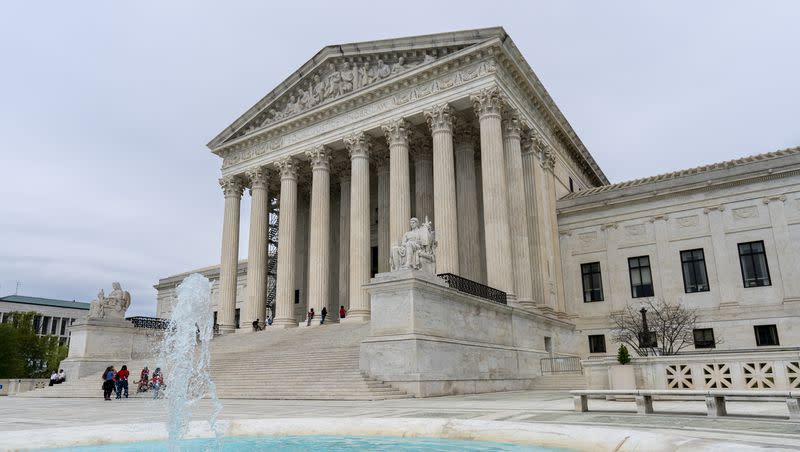What the Supreme Court said Tuesday about working on the Sabbath

- Oops!Something went wrong.Please try again later.
- Oops!Something went wrong.Please try again later.
Forty-six years ago, the Supreme Court issued a ruling that either dramatically weakened the rights of religious workers or fairly limited them, depending on whom you ask.
What members of each camp agree on is that the decision was badly worded, since it said employers need not grant religious accommodation requests that pose more than a “de minimis” — or, in other words, trifling — cost.
Gerald Groff, a former post office employee who believes his former supervisors had a legal duty to accommodate his request to not work on the Sabbath, has taken his battle over the 1977 ruling all the way the Supreme Court. He and his supporters say the “de minimis” language has caused untold harm for more than four decades and needs to be overturned.
“Every factor leans toward overruling,” said Aaron Streett, who argued on behalf of Groff during oral arguments Tuesday.
Related
But the government, represented in the case by Elizabeth Prelogar, the solicitor general of the United States, asserts that overturning the 46-year-old ruling would be an overreaction to a poorly worded but ultimately harmless phrase.
Since 1977, courts across the country and the Equal Employment Opportunity Commission have thoughtfully applied the Supreme Court’s previous decision, focusing on factors other than the “de minimis” line, she said.
“It’s just incorrect to say there’s not a substantial amount of accommodation happening,” Prelogar said, arguing that overturning the previous ruling would throw decades of meaningful case law into question.
Now, it’s up to the Supreme Court to decide which of the two viewpoints should win out. At oral arguments Tuesday, the justices seemed to agree the “de minimis” language was misleading, but disagree on whether a big move, like throwing out the 1977 ruling, would actually bring clarity to a decades-old debate.
“I’m not sure we can give you a full manual of how it’s going to play out,” said Justice Brett Kavanaugh at one point.
Overview of Groff v. DeJoy
Groff’s case, like the one from 1977, centers on Title VII of the Civil Rights Act, which outlaws religious discrimination in the workplace.
Under the statute, employers are prohibited from, among other things, refusing to hire or promote members of a certain faith group. They’re also required to honor religious accommodation requests, unless doing so would pose an “undue hardship” on their business.
Groff, who previously worked as a rural mail carrier, says the Postal Service — and the lower courts — wrongly determined that his request to not work on Sundays triggered the undue hardship exemption, largely because they relied on the “de minimis” language from 1977.
He wants the Supreme Court to overturn its past ruling and say that only a significant difficulty or expense should count as an undue hardship.
A key obstacle standing in the way of a potential win for Groff is the fact that Congress has had several opportunities over the past four decades to strengthen protections for religious workers, opportunities that it let pass.
At several points during oral arguments Tuesday, justices questioned whether the Supreme Court should overturn a statutory interpretation that Congress has allowed to stand. Justice Ketanji Brown Jackson, for example, wondered whether doing so would send the wrong message to the American public.
“I’m concerned that a person could fail to get in Congress what they want and then just come to the court and say, ‘You just give it to us,’” she said.
Prelogar said the most the Supreme Court should do is clarify how to apply the 1977 ruling to make it clear that the “de minimis” language should not be taken literally.
But she asserted that such a misstep has been an uncommon occurrence, and that Groff’s request for all Sundays off represents an undue hardship even if you define hardship as a significant difficulty or expense.
“This was not some minor inconvenience to the Postal Service,” she said.
Like Groff’s team, Prelogar faced pushback over some of her assertions, most notably from Justice Samuel Alito. He questioned whether the EEOC and lower courts have really been performing as well in Title VII cases as Prelogar made it sound.
If the “de minimis” language isn’t causing an issue, then why did so many faith groups file Supreme Court briefs insisting that it needs to change, he asked.
“We have amicus briefs by many representatives of many minority religions: Hindus, Muslims, Orthodox Jews, Seventh-day adventists. They all say (the 1977 ruling) has violated their right to religious liberty. Are they wrong?” Alito said.
Prelogar responded that the faith groups are “not accurately portraying” the legal landscape and urged Alito and the other justices to consult EEOC documents to learn more about the government’s current approach to accommodation requests.
When will the Supreme Court rule?
As Kavanaugh noted, the Supreme Court will never come up with a perfect solution. However it rules, there will still be questions about what counts as an undue hardship, since all Title VII cases are context-specific.
What the Supreme Court must decide, then, is whether the “de minimis” language from 1977 is confusing enough to warrant an overhaul of that past decision or if it’s better to issue a simple clarification.
If it goes the former route, then Groff will likely, at the very least, win the chance to re-argue his case in the lower courts.
Prelogar warned that such a step would cause widespread confusion, making it even more difficult for employers, the EEOC and judges to work out what businesses owe to religious employees.
But Groff and his supporters have said it would still be a step in the right direction, since it would give religious workers more power to meet their faith-based needs.
The Supreme Court is expected to issue its decision by the end of June.

